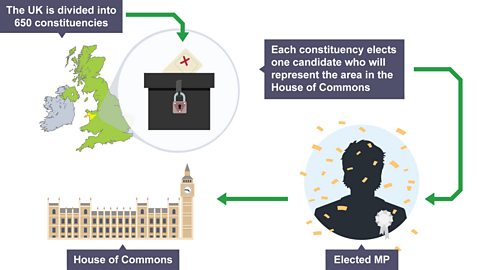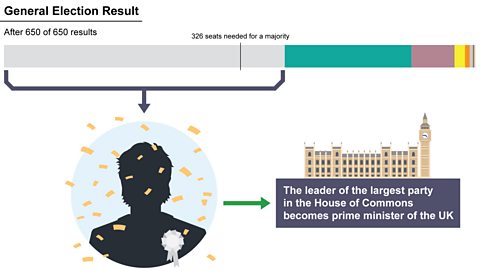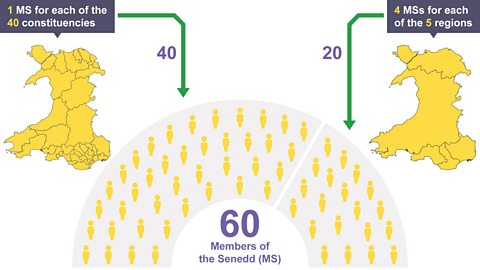Introduction
What happens after citizens vote? Who has the power?

United Kingdom (UK) Parliament
The UK Parliament are the two chambers in the Palace of Westminster, referred to as the House of Commons and House of Lords. These two chambers play an important part in the legislative process in the UK as they have to verify that the government is making appropriate decisions. Parliament has great power as it is sovereign, which means that Parliament has the highest authority in the UK.
Westminster
When you vote in a general election, you will be electing a Member of Parliament to represent you in Parliament at Westminster, London.
House of Commons
Your Member of Parliament will sit on one of the green seats in the House of Commons (if they’re lucky - there aren't enough seats for everyone to sit on!) Your MP will usually be a member of a political party and each political party will compete to gain as many of the 650 seats as possible in each election.

House of Lords
The House of Lords is different in that its members are not elected. 92 Lords are hereditary peers and 26 Church of England bishops have the right to sit there. The rest have been appointed by the King on the advice of the prime minister.

UK government
If we think about how the UK government is formed, it becomes apparent why each party competes so vigorously to gain seats in the House of Commons.
- The prime minister
An election does not take place to select a prime minister in the UK as in some other countries. The leader of the largest party in the House of Commons becomes the prime minister. Therefore, the party with the most seats occupies the highest position in UK politics.

- The Cabinet
As there is so much work involved in governing a country, the prime minister needs support. The prime minister will select MPs from the House of Commons and members of the House of Lords to be ministers. The group made up of the prime minister and the most important ministers is called the cabinet. Together, the cabinet has the power to make all UK government decisions. The cabinet therefore governs the UK.
Every member of the government comes from the largest party in Parliament or one that is part of a coalition.
Every member of the government is part of Parliament but not every MP is part of the government.
Remember however, that the government is accountable to Parliament because Parliament is sovereign.

Devolution
Devolution means shifting power from the centre to the edges. Tony Blair's Labour government wanted to distribute some of the powers of the UK Parliament to Wales, Scotland and Northern Ireland. In 1997, separate referendums were held in Wales and in Scotland. The people of both countries voted in favour of devolution.
Which powers?
Senedd Cymru was given the power to make decisions in 20 areas, including:
- agriculture
- culture
- economic development-
- education
- the environment
- health
- transport
- local government
- tourism
- the Welsh Language
However, the UK Parliament held on to some powers, for example:
- foreign affairs
- police and justice
- currency
- most benefits
- most taxes
From when it was first established in 1999 until May 2020, Senedd Cymru in Cardiff Bay was called Cynulliad Cenedlaethol Cymru (National Assembly for Wales).
Senedd Cymru
The role of Senedd Cymru is to legislate, agree on some Welsh taxes and to make sure that Welsh government makes appropriate decisions.
The current voting system
Members of the Senedd are elected in Wales elections to represent the people of Wales every five years. In the last election there were 40 constituencies in Wales and one member represents each constituency. For Wales elections, the country is also divided into five regions. Four people represent each of those regions, which means an additional 20 members. This makes a total of 60 Members of the Senedd.
Changes to the voting system
In May 2024, Members of the Senedd voted to increase the number of members and introduce a new voting system for the next election in 2026.
Under the new system:
- Senedd elections will be held every four years instead of five
- there will be 96 Members of the Senedd, an increase of 36
- the current 40 constituencies will be replaced by 16 larger ones
- each constituency will be represented by six members
- the current first-past-the-post system will be replaced by a system that reflects the share of the vote each party has received in each of the constituencies

Welsh government
The Welsh government is the devolved governance of Wales. Similar to the UK government, members of the Welsh government come from Senedd Cymru.
The first minister is the leader of the largest party, and the first minister has the power to decide who will be in the cabinet. Members of the cabinet will be selected from the Senedd and are usually members of the largest party or the coalition.

More on Politics and democracy
Find out more by working through a topic
- count4 of 7

- count5 of 7

- count6 of 7

- count7 of 7
